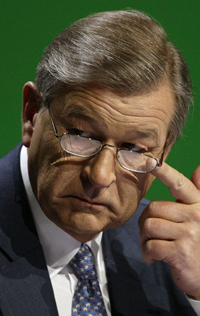UBS writes off $19b, chairman goes
(Agencies)
Updated: 2008-04-01 23:15
Updated: 2008-04-01 23:15
ZURICH - UBS AG's chairman abruptly resigned Tuesday as the Swiss bank reported a first-quarter loss of $12.1 billion and said it would seek $15.1 billion in new capital.
 Swiss bank UBS Chairman Marcel Ospel reacts as he attend the extraordinary general meeting of the bank in Basel February 27, 2008. [Agencies]
|
UBS revealed more serious damage from exposure to the US subprime crisis and said it expects write-downs of approximately $19 billion.
As UBS Chairman Marcel Ospel stepped down, Deutsche Bank AG, Germany's largest bank, announced similar write-downs of about $4 billion.
It was the latest indication of how far the severe plunge in US housing prices and a credit crisis triggered by rising mortgage defaults has reached.
UBS write-downs have reached a staggering $40 billion in the past nine months, the largest reported by any bank to date.
Standard & Poor's cut the bank's credit rating one notch to AA-, citing "risk management lapses, earnings volatility and need for new capital."
UBS said that after it raises new capital, its Tier 1 capital ratio, a key indicator of a bank's ability to absorb losses, would be about 10.6 percent. That is well above minimum European requirements of 4 percent and bank shares rose 8.66 percent to 31.36 francs ($31.53).
Ospel said he was ultimately responsible for the bank's health as he stepped down.
"My willingness to stand for re-election for a further one-year term was based on my desire to lead UBS out of its current difficult situation," Ospel said. "We have worked very hard and have been able to address the firm's most pressing problems, thereby laying the foundation for the long-term success of the bank."
The bank said its move to raise capital through a rights issue that would be fully underwritten by four leading international banks and would enable it to remain "one of the world's strongest and best capitalized banks."
"In the first quarter, UBS substantially reduced its real estate related positions through both valuation adjustments and significant disposals," the bank said.
It said it would create a new unit to "hold certain currently illiquid US real estate assets."
"UBS is confident that these measures will deal effectively with the firm's real estate exposures and allow the bank to focus on strengthening its core operations," the statement said.
Chief Executive Marcel Rohner said, "We believe this capital increase and the creation of a vehicle to separate problem assets from the remainder of our businesses will allow us to return to sustainable value creation over time."
He said profits from most of the bank's businesses "remained acceptable in challenging conditions" during the first quarter.
"We have made further prompt writedowns and sales of our impaired US real estate-related positions," Rohner said. "We have reduced risk weighted assets and implemented measures to control costs and strengthen the structure of the firm."
|
||
|
||
|
|
|
|

